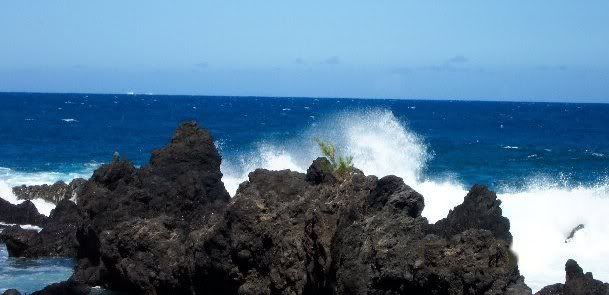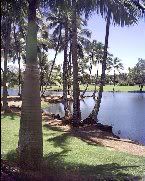

Name~ Hokule'a Kealoha
Short Bio~Hokule'a Kealoha is the Nom De Plume of a writer that formerly lived in Hawaii and is now living a life of adventure on the highways and byways of the American South . I am a Born Again follower of Jesus, as well as a wife, mother of cats and dogs,jeweler, entreprenuer, photographer and pilgrim...
Age~ Old enough to know better
Status~ Newly Single after 13 years of marriage,fur mom to the loving and devoted mini ShihTzu doggie Annabelle, born 6-11-2007 RIP 2-25-09, and the beautiful Abigail born 2-14-09
Hair Color~ natural brown/grey
Mood~ I ALWAYS have a mood, try me...
Loving~ Jesus, Hawaii, my furry friend, Abigail, my Pen Pals, Jewelry ,Blogging ,Writing anything,my Ipod,and being outdoors surrounded by my wonderful natural surroundings
Hating~ Boom Box Cars, Earspray, Abuse of Power,
Reading~
Bible
Magnificat
Link
Link
Underwired! Louisville's magazine for Women
In Store~The Magazine for the American Jeweler
Books in Progress...
CATECHISM OF THE CATHOLIC CHURCH
"Link"
"Link"
Just Finished Reading
"Link"
Link
Link
Link
Jesus, Divine Mercy ~

I Trust In You~
My Favorite Past Posts~Relive The Journey!~
2009~
Link
Link
Link
Link
Link
Link
Link
Link
2008~
Be Thankful
Colateral Damage
Make Lemonade
Home Is Where The Heart Is
The Poor With Us
Because Its The Hardest Thing I Can Do
We Have All Become Victims
Lest I Forget
The Most Important Words
Family Values
Familiar Places
May Perpetual Light Shine On Them
A City In Motion
2007~
The Quiet Storm
Fellowship of the Cane
Like Dead Unremembered: A 9-11 Tribute
The Medicine Machine
One Giant Leap
In The Steps of St. Francis
Too Much Information
The Un Choice
2006~
The Holly and the Ivy
The First 9-11, Dec 7,1941
Small Moments of Silence
Peaches to Winnipeg
Dreaming of Hawaii
Memorial Day
Scattered Values
The White Line is the Lifeline for the Nation
Warnings of a New Civil War
I Will Be True To The Promise I Have Made
The Snowy Bloody Day
Cats in the Cradle
2005~
The Journey
Rebirth of a City
For Posterity's Sake
The New Civil War
Every Mother's Son
And There You Stayed, Temporarily Lost at Sea
The Lone Rider
The Bible Is Not the Fourth Member of the Trinity
Rome Wasn't Built With Union Labor
Happy Birthday Mom ~revised~
A Beautiful Noise
Even Now
The Wearing of the Red
Night Ranger
The Joyful Traveler
Hoiliili "To Gather Up"
Ke Makakilo (My Observations)
He Giveth Sleep
Save The Children
2004~
Lux Aeterna
December 2004
You're Joking, Right?
Ground Zero
I Am Not A Failure
O,To Grace, How Great A Debtor
Lost In Translation
One Small Step for Man
The Rainbow's End
Profanity
Taps
The Journey
Makoa's Song
No Aloha For The Weakest
The Paradoxical Comandments
The Time Is Now
2003~
When No Fruit Is On The Vine

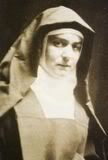
St. Edith Stein~Pray for Us
Religion Link List~
My Secret is Mine
Ignatius Insight-Online Magazine
Fr John Corapi SOLT
Dr. Scott Hahn St Paul Center
Fr. Mitch Pacwa~ Ignatius Productions
Link
Link
Link
Link
Link
Political Link List~
Link
Link
Link
link
Arkansas Link List~
Little Portion Hermitage
John Michael Talbot website
John Michael Talbot Myspace page
1st United Methodist Church Bella Vista
Northwest Arkansas Guide
Mimi's Cafe
Metro Woman Business Directory of NW Arkansas
River Grille
Link
Link
Link
Interactive Links~
Live WebCam Feed from the Mauna Lani Resort, Kohalla, Big Island of Hawaii
Click here for Aloha Joe!Live Hawaiian Music 24/7
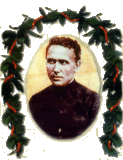
St. Damien of Molokai'i, Patron of Hawaii and the Outcasts among us, pray for us....

Hawaii Links~ ~
For more Hawaii links Click Here
Volcano Updates (Pele's Mood Meter)Hawaii Volcano Observatory
Hawaii Volcanoes National Park
Volcano Watch Archives
Mauna Kea Observatory
Pacific Tsunami Museum
Link
Link
Link
Link
Technorotica for Blogging~




Who Links Here...Click here to see who's linking to this site. Powered by WhoLinksToMe.com
Globe of Blogs~Blog search engine
The Blog Search Engine
stock xchng
Photobucket
BlogSkins
Link
Wikipedia
Nuzio's Place on the Web
Commutefaster.com
PING ME!
MWBS Wordpress Edition
Link
Technorotica for Jewelers, and the Jewelry Trade~
Gemological Institute of America
The Drouhard National Jewelers School
The Conner School
Link
Link
|
November 23, 2005
The First Thanks Giving
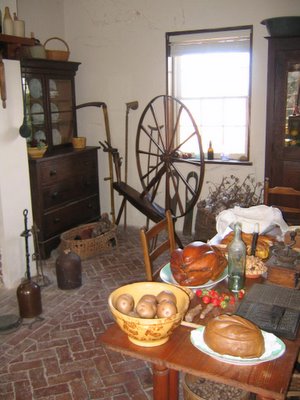 Where many feasts were prepared...The restored circa 1830 kitchen house of the mansion "Rosalie" Natchez Mississippi Posted in Little Rock Ar 11-22-05 As Woody and I were driving from Natchez to Little Rock today we were listening to a local radio station that had the show " Truths that Transform", out of Coral Ridge Ministries in Florida. They had a man on that quoted from a letter sent to England by William Bradford (I believe) about the "first thanksgiving" I was unable to chase down a transcript of that show it was that good but I did pull up this delightful website on Plimouth Plantation Very much worth a look and if you are in the area a look see. My thanks for permission to reproduce this snippet on my blog. With all of the silly politicaly correct garbage being spewed out and revisionist history being taught...lets not forget that this nation was founded on prayer and gratitude, and that the first European Americans for the most part did want to live in peace with the Indians. Thanksgiving is about God, prayer and gratitude, not football and self indulgence... Fast and Thanksgiving Days
of Plymouth Colony
by Carolyn Freeman Travers, Research Manager
The Separatists who founded Plymouth Colony observed three holy days; the weekly Sabbath, the Day of Humiliation and Fasting, and the Day of Thanksgiving and Praise. The latter two were held for special circumstances. A series of misfortunes meant that God was displeased, and the people should both search for the cause(s) and humble themselves before him. Good fortune, on the other hand, was a sign of God’s mercy and compassion, and therefore he should be thanked and praised. Over time, with the influx of new colonists and new faiths, as well as the political changes in England and New England, the holiday changed, becoming more secular. By the end of the century, the colonial government established a cycle of annual spring Fast Days and autumn Thanksgivings.
Early fast days and thanksgiving days were similar in many respects. They were called by either church or civil officials or the two working together. Occasionally, officials reacted to one overwhelming situation, such as an epidemic. More frequently, there were a number of reasons. For example, causes for a 1641 Day of Humiliation in the Barnstable church were: “In regard of the wett & very cold Spring, as also for the quelling of Strange & heretical tenets raised principally by the Ffamilists, as also for the healing of the bloodye Coffe amonge children especially at Plimouth.”1 A 1685 Day of Thanksgiving in the Plymouth church was held for “continuance of spirituall & civill liberties, a good harvest notwithstanding a threatening drought, & for health.”2 In the minds of the Plymouth colonists, that mixture of events were all traceable to one source – God – and his relationship with the community. Relief from misfortune would come (they hoped) after reconciliation with God through fasting, prayer and repentance. Fortunate events required public expression of gratitude with praise and thanksgiving.
The first Day of Humiliation for the Plymouth colonists actually occurred before the Separatist congregation left the Netherlands. As described in Bradford’s history, “So being ready to depart, they had a day of solemn humiliation, their pastor taking his text from Ezra viii.21: ‘And there by the river, by Ahava, I proclaimed a fast, that we might humble ourselves before our God, and seek of him a right way for us, and for our children, and for all our substance.’ Upon which he spent a good part of the day very profitably and suitable to our present occasion, the rest of the time was spent in pouring out our prayers to the Lord with great fervency, and with abundance of tears.”3 This type of fast day was not a response to misfortune, but an appeal for God’s aid at the beginning of a new enterprise. Later colonial churches would call these fast days when choosing new officers and creating or renewing their covenant.
While the harvest celebration held in Plymouth Colony in 1621 has been mistakenly referred to as the “First Thanksgiving” since the 1800s, the first Thanksgiving Day as the Separatists understood it occurred in 1623. As with many later New England Days of Thanksgiving, it followed a Day of Humiliation. The events of that summer, described in colonist Edward Winslow’s Good Newes from New England, show clearly how the Separatists saw their relationship with God and used these two holidays to reconcile and affirm that relationship.
In 1623, the colony was still struggling to survive. The colonists were critically low on food. For months they had been expecting a ship with supplies and additional colonists. The spring planting of Indian corn and beans began well. By mid-July, however, “it pleased God, for our further chastisement, to send a great drought, insomuch as in six weeks after the latter setting there scarce fell any rain; so the stalk of that which was first set began to send forth the ear, before it came to half growth, and that which was later was not like to yield any at all, both blade and stalk hanging the head, and changing color in such a manner, as we judged it utterly dead. Our beans also ran not up according to their wonted manner, but stood at a stay, many being parched away, as though they had been scorched before the fire. Now were our hopes overthrown, and we discouraged, our joy being turned into mourning.” Additionally, the expected ship had not been heard of for three months, “only the signs of a wreck were seen along the coast, which could not be judged to be any other than the same.” The colonists were devastated. “The most courageous were now discouraged, because God, which hitherto had been our only shield and supporter, now seemed in his anger to arm himself against us.”
These misfortunes “moved not only every good man privately to enter into examination with his own estate between God and his conscience, and so to humiliation before him, but also more solemnly to humble ourselves together before the Lord by fasting and prayer. To that end a day was appointed by public authority,....” Winslow did not describe the religious exercises, but stated that they lasted “some eight or nine hours.” The next morning “distilled such soft, sweet, and moderate showers of rain, continuing some fourteen days, and mixed with such seasonable weather, as it was hard to say whether our withered corn or drooping affections were most quickened or revived.” Captain Myles Standish, returning from the north, brought further good news. The supplies and new colonists were safe, although delayed, and again on their way.
Their prayers answered, the colonists thought “it would be great ingratitude, if secretly we should smother up the same, or content ourselves with private thanksgiving for that, which by private prayer could not be obtained. And therefore another solemn day was set apart and appointed for that end; wherein we returned glory, honor, and praise, with all thankfulness, to our good God, which dealt so graciously with us;....”4
This, then, was the first Thanksgiving Day held in Plymouth Colony. It occurred most likely at the end of July and consisted of a lengthy church service. Probably, there was no feasting. Bradford lamented in his history, that when the new colonists arrived soon after, the “best they could present their friends with was a lobster or a piece of fish without bread or anything else but a cup of fair water.”5 Descriptions of later observances in surviving church records provide more details of the probable structure of the services.
Reverend Cotton described a 1684 Plymouth Fast Day service “May 2: the day of Fasting & Prayer was solemnly attended by the whole church in the Pastors house. The Pastour first prayed & preached, then Mr Fuller prayed: Afternoone the Elder prayed, Secretary Morton, Deacon Finney & Thomas Faunce; ... Deacon Morton spake to the church about Intemperance, & long sitting at ordinaryes etc the Elders & Bretheren that spake to it all agreed in their Testimony against those evills & their desires that God would helpe all to more care & watch fullnesse in all respects: the 122 Psalme was sung, & the Pastour minding of the Lords supper to be the next Sabbath, he then ended with a prayer;...”6 Reverend Cotton did not mention food in connection with this fast day, although it was permissible to eat after the final prayer on a fast day. An English visitor to a 1660 Salem fast day for the ordinations of a teacher and elder said, “After the exercise, I was invited to the elder’s house, where was good company and good cheer [food].”7
At a 1636 Day of Thanksgiving held by Reverend Lothrop’s Scituate church: “in ye Meetinghouse, beginning some halfe an houre before nine, & continued until after twelve a clocke, ye day beeing very cold, beginning with a short prayer, then a psalme sang, then more large in prayer, after that an other Psalme, & then the Word taught [sermon], after that a prayer – and then a psalme, - Then makeing merry to the creatures, the poorer sort beeing invited of the richer.”8 About a 1639 Thanksgiving Lothrop said, “our praises to God in publque being ended, wee devided into 3 companies to feast togeather.”9 As early as the 1630s, therefore, some congregations were feasting after the service.
Over the 17th century, Plymouth Colony held many of these special observances as circumstances required. Beginning in the 1680s, officials called for public thanksgiving and fast days “for the mercies of the yeare” on an annual basis. In the 1700s, they settled into a cycle of spring Fast Days and autumn Thanksgivings. The Massachusetts government abolished the state’s April Fast Day in 1894. Its annual Thanksgiving Day, held on the last Thursday of November, was absorbed by the national Thanksgiving Day established by President Abraham Lincoln in 1863. The latter was the first nationally declared Thanksgiving Day for the United States, which is still observed on the fourth Thursday each November to the present day.
NOTES:
1. John Lothrop, “Scituate and Barnstable Church Records,” The New England Historical and Genealogical Register 10 (January, 1856):p. 38.
2. John Cotton, Jr., “Plymouth Church Records, Volume I, Part V,” Publications of the Colonial Society of Massachusetts: Volume XXII: Collections (Boston: The Society, 1920), p. 257.
3. William Bradford, Of Plymouth Plantation, 1620-1647, Ed. Samuel Eliot Morison (New York: Alfred A. Knopf, 1952), p. 47.
4. Edward Winslow, Good Newes from New England, [1624], ed. Alexander Young (Bedford: Applewood Books, 1996), pp. 54-56.
5. Bradford, p. 130.
6. Cotton, p. 255.
7. Thomas Hutchinson, The History of the Colony and Province of Massachusetts-Bay, ed. Lawrence Mayo, 3 vols. (Cambridge: Harvard University Press, 1936), I:359.
8. Lothrop, p. 39.
9. Lothrop, p. 39.
|
|
















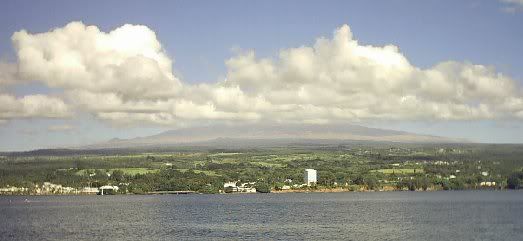
 based on design by mela
based on design by mela